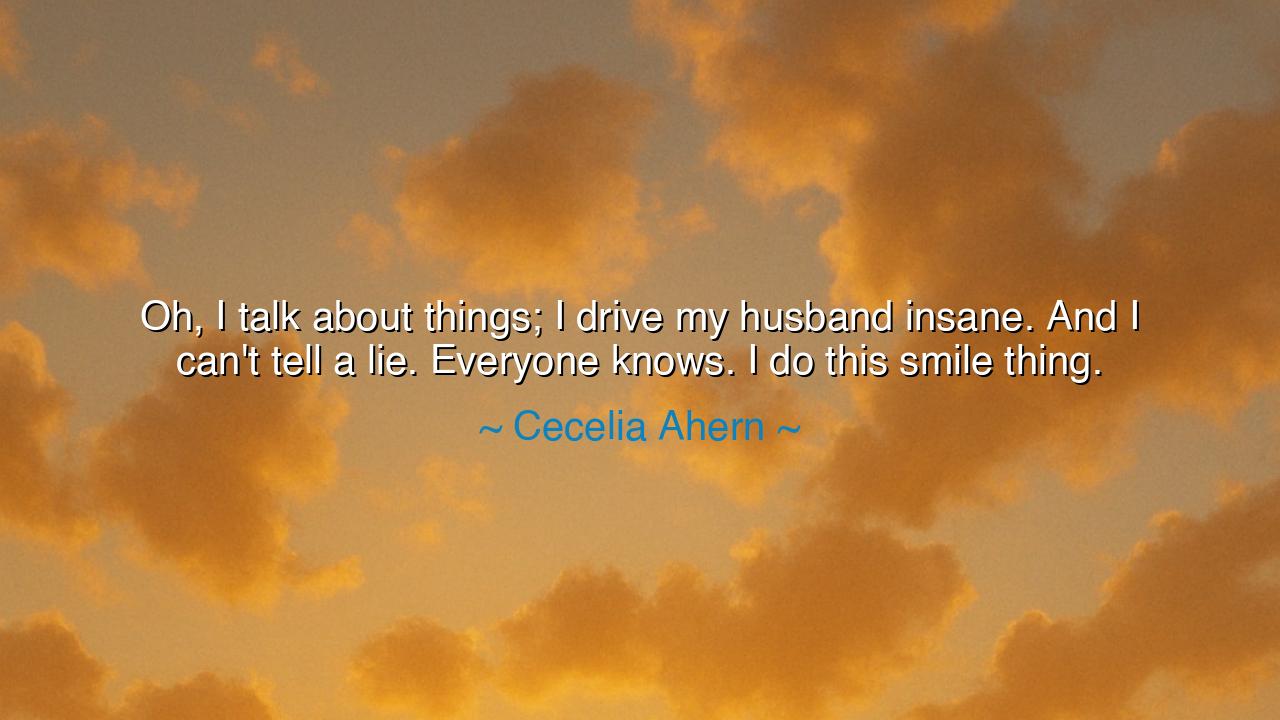
Oh, I talk about things; I drive my husband insane. And I can't
Oh, I talk about things; I drive my husband insane. And I can't tell a lie. Everyone knows. I do this smile thing.






In the words of Cecelia Ahern, author of tales that weave whimsy with truth, we find an honest confession: “Oh, I talk about things; I drive my husband insane. And I can't tell a lie. Everyone knows. I do this smile thing.” These words, light in tone, reveal the deep reality of authenticity and transparency in human nature. For the smile here is not merely an adornment, but an involuntary truth-teller, a signal that the heart cannot easily disguise its honesty.
To talk about things, as Ahern admits, is to live with openness. Some carry secrets, others cloak themselves in silence, but she reveals herself to be of a spirit that cannot hold back. Her smile betrays her, and in that betrayal lies both her vulnerability and her strength. For a person who cannot easily lie is both exposed and pure—exposed to the world’s judgments, but pure in the sense that what you see is truly what you get. The ancients would say: such a soul is unarmored, and yet armed with the strength of sincerity.
The smile thing that Ahern describes recalls an ancient truth: the body reveals what the lips try to hide. Even in Roman courts, orators would speak of how the eyes and the face betray deception, no matter how skilled the tongue. Cicero himself argued that truth carries a light upon the face which no actor can fully counterfeit. Thus, Ahern’s confession is not only personal—it is a reminder that the smile often speaks louder than crafted words.
History gives us countless examples. Consider the tale of Abraham Lincoln, who was often described as a man whose face could not mask his inner life. His melancholy was visible, and his smile, when it came, radiated sincerity. It was said that one could trust Lincoln’s humor and compassion because they were etched upon his very features. Like Ahern, he could not easily lie; his countenance made plain what was within. This transparency, far from weakness, became the foundation of trust between him and his people.
The wisdom here is that authenticity, though sometimes inconvenient, is a source of power. Those who cannot lie convincingly, who smile and give themselves away, are often the ones who create the deepest bonds. For in a world where words can deceive, people hunger for gestures that ring true. To let your natural expressions reveal your heart is to live without masks, and though it may drive some “insane,” it creates trust that endures.
The lesson, then, is simple: embrace your truth-telling nature. If your smile betrays you, let it do so gladly. If you talk too much, let your words at least be honest. Do not strive to perfect the mask of deception, but instead cultivate sincerity as your armor. In the long run, the one who lives in openness and authenticity will be remembered not for cunning, but for trustworthiness.
So, beloved, take Cecelia Ahern’s words to heart: when you feel the impulse to hide behind silence or falsehood, let your smile remind you of the power of truth. For authenticity may bring small struggles, but it yields great peace. In a world weary of lies, your openness will be as refreshing as sunlight—and though it may disarm you, it will also set you free.






AAdministratorAdministrator
Welcome, honored guests. Please leave a comment, we will respond soon